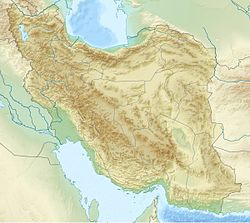Top Qs
Timeline
Chat
Perspective
Shah Abdol-Azim Shrine
Mosque and mausoleum complex in Rey, Tehran, Iran From Wikipedia, the free encyclopedia
Remove ads
The Shāh Abdol-Azīm Shrine (Persian: شاه عبدالعظیم; Arabic: مرقد الشاه عبد العظيم الحسني)[a] is a Twelver Shi'ite funerary monument and religious complex, located in Rey, in the province of Tehran, Iran. The complex contains the tomb of ‘Abdul ‘Adhīm ibn ‘Abdillāh al-Hasanī[4] (aka Shah Abdol Azim). Shah Abdol Azim was a fifth generation descendant of Hasan ibn ‘Alī[4] and a companion of Muhammad al-Taqī.[4] He was entombed here after his death in the 9th century CE.
Adjacent to the shrine, within the complex, are the mausolea of Imamzadeh Tahir (son of the fourth Shia Imam Sajjad) and Imamzadeh Hamzeh (brother of the eighth Twelver Imām - Imām Reza).
The complex was added to the Iran National Heritage List in 1942, administered by the Cultural Heritage, Handicrafts and Tourism Organization of Iran. The complex is one of the holiest sites in Twelver Shi'ism.
Remove ads
Background
Abdol Azim migrated to Ray out of persecution[4] and subsequently died there. A piece of paper was found in his pocket outlining his ancestry as being: ‘Abdul ‘Adhīm son of ‘Abdillāh son of ‘Alī son of Hasan son of Zayd son of Hasan ibn ‘Alī.[4] Shah Abdol Azim was sent to Ray (modern-day Tehran) by Imam Reza.
History and design
Ibn Qūlawayh al-Qummī (d. 978 CE) "includes the shrine in his Kāmil al-Ziyārāt, one of the earliest pilgrimage guides for the Shiʿa, which suggests that the tomb of ʿAbd al-Aẓīm was already of some importance by the tenth century."[5][6] The tomb of Abdol-Azim had also come under the patronage of Sunni rulers at times, a notable example being the mausoleum constructed over Abdol-Azim's tomb in the 1090s CE by orders of the Seljuk vizier Majd al-Mulk Asʿad b. Muḥammad b. Mūsā.[7][8][9][10]
This door has an inscription in Thuluth script.
Remove ads
Notable burials
In addition to Abdol-Azim al-Hassani, the shrine is the burial site for many notable individuals, including members of the Qajar family, and many notable political figures, scholars, and clerics, from the Medieval period to contemporary times.
Gallery
See also
Notes
References
Further reading
External links
Wikiwand - on
Seamless Wikipedia browsing. On steroids.
Remove ads













